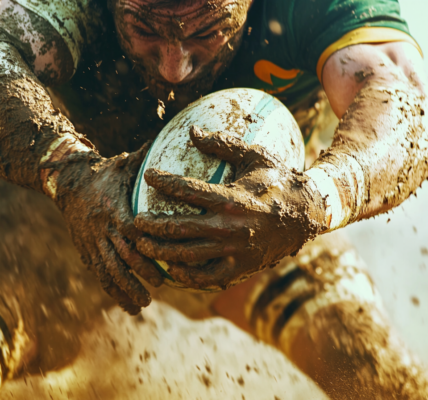There’s what you see on screen. The passes, the scrums, the celebrations. But the game’s truest pulse? You’ll find it in the invisible rituals, the stuff no camera ever catches. The dirt under the fingernails, the taste of blood mixing with salt, the split-second prayer whispered into a collar before the anthem hits.
For every try scored under stadium lights, there’s a pre-dawn run no one sees. A knee strapped in a bathroom. A teammate’s boot laced by someone else’s fingers because their hands are too swollen to manage. These are the unspoken codes of rugby. Not strategy or structure, but superstition, habit, grit. There are players who never shave on game day. Who won’t touch certain jerseys before kick-off. Who tie their boots in a specific order because one time, five years ago, they didn’t, and lost. It’s irrational. It’s beautiful. And it matters, even if science can’t explain it.
Even in high-performance environments, where sport science reigns and protein is measured to the gram, there’s space for something older. Something primal. A sacred messiness that refuses to be tracked, logged, or explained. You’ll find it in the way players gather silently before the first whistle, as if every match is a kind of ceremony.
Because rugby isn’t just a sport. It’s a space where belief meets pain. Where the body is tested, but the mind, quietly, relentlessly, must be fortified. That fortification doesn’t always come from coaches or data dashboards. Sometimes it comes from the music a player listens to while taping up their knuckles. Sometimes it’s an old note stuck in a kit bag, read before every match.
Across the province, from the polished turf of Kings Park to the dust-choked fields of Zululand, players carry these rituals with them. Some are passed down, teammate to teammate, like oral folklore. Others are entirely personal, stitched into the private fabric of identity. And they evolve. What began as a superstition in high school may later become a source of grounding during a professional tour abroad.
Some rituals are shared. Entire teams will eat the same meal, line up in the same order, wear the same kit combinations for ‘luck.’ Coaches might roll their eyes, but no one interrupts it. Because when players believe, momentum builds. Confidence swells. And in a game decided by inches and seconds, belief is currency. But these rituals aren’t always about winning. Sometimes, they’re a tether. A way of controlling the chaos. When you’re far from home, facing an unfamiliar opponent in an even more unfamiliar stadium, it helps to have something, anything, that feels like yours. A ritual becomes a pocket-sized home.
What’s striking is how few of these habits are ever spoken about publicly. Players don’t usually admit to them in interviews. Coaches don’t diagram them on whiteboards. Yet they’re as much a part of rugby as the laws of the game. Maybe more so. Because they remind us that even at the pinnacle of professionalism, this is still a deeply human pursuit.
 There’s something poetic about that. The idea that amid the high-tech kits, HD broadcasts, and biometric scans, a player still ties one boot before the other because of what happened in a school final ten years ago. It speaks to the emotional architecture of the sport. A structure built not just on muscle and tactics, but on memory and meaning.
There’s something poetic about that. The idea that amid the high-tech kits, HD broadcasts, and biometric scans, a player still ties one boot before the other because of what happened in a school final ten years ago. It speaks to the emotional architecture of the sport. A structure built not just on muscle and tactics, but on memory and meaning.
And make no mistake, these rituals don’t end when the final whistle blows. Post-match routines, whether it’s the same playlist on the bus, a silent walk around the field, or a call to a parent, are just as sacred. They help players process what just happened. Whether it’s the thrill of a win or the devastation of loss, ritual becomes a form of emotional translation.
In a world where everything is analysed, performance-optimised and hyper-visible, rugby’s unseen moments still carry weight. They may be odd, unexplainable, even a little silly, but they are deeply human. And in that, they are also deeply necessary.
We often say rugby teaches values: discipline, respect, courage. But perhaps one of its most underrated lessons is the value of the unquantifiable. Of the things we carry not because they’re proven, but because they matter to us. Because they anchor us.
So next time you see a player pause, tap their chest, or whisper something into their sleeve before a kick-off, don’t dismiss it as superstition. See it for what it is: a lifeline. A rhythm. A tiny act of meaning in a brutal, beautiful game.
And somewhere, in a quiet corner of a changing room, another player will be doing the same. Carrying the flame. Passing it on.
That’s rugby too.




